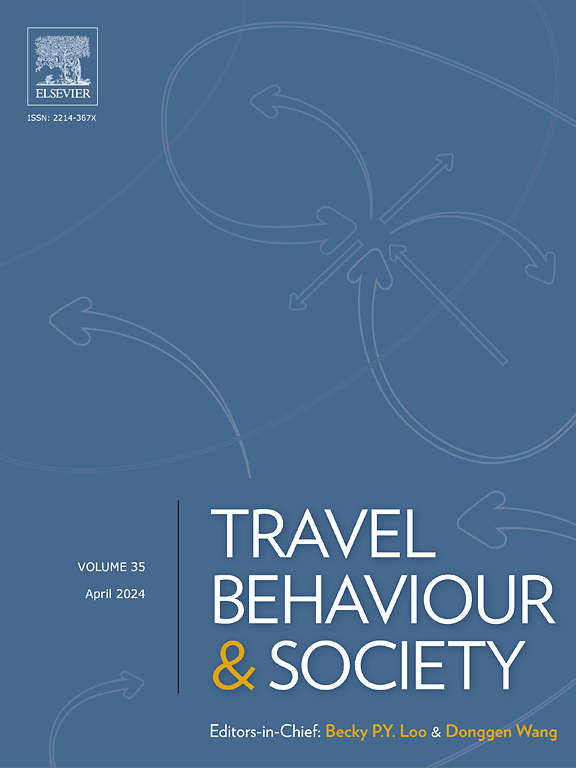The paradox of post-pandemic travel: Reduced car travel but unabated congestion? Insights from Cambridge, UK
IF 5.7
2区 工程技术
Q1 TRANSPORTATION
引用次数: 0
Abstract
Despite a marked decline in overall travel demand in Great Britain, some cities are experiencing unabated, if not worsened, traffic congestion. This study aims to investigate this paradox of post-pandemic travel through an in-depth case study of Cambridge, a city with a high proportion of highly-skilled professional employment in the UK. Using longitudinal traffic counts and car journey time data, we compare intra-day and intra-week travel demand patterns across four distinct periods between 2019 and 2024, controlling for monthly variation, school and university term, bank holidays, major public events, roadworks, traffic accidents and weather. Our model-based analysis finds that recent car and cycle demand in Cambridge remains at 11.6% and 15.8% below pre-pandemic levels, respectively, but the demand recovery has stabilised since 2022. Despite the overall reduction in travel demand, daily average journey time on key transport corridors in Cambridge has increased by 12.0% from 2022 to 2024, exemplifying the paradox of post-pandemic travel. We find that 1) the increase of average journey time is caused by worsening congestion at evening peaks and on Thursdays, with the former being the primary factor; 2) the increase of peak-time congestion is not associated with increasing demand across major modes of road transport (car, cycle, bus, van and taxi); and 3) the recent increase of journey time in Cambridge is thus likely to be caused by supply-side factors, notably the reallocation of road space for public and active modes and temporary road closures which affect overall road capacity. Important policy implications are drawn.
大流行后出行的悖论:汽车出行减少,但拥堵丝毫未减?来自英国剑桥的见解
尽管英国的整体旅游需求明显下降,但一些城市的交通拥堵情况即使没有恶化,也丝毫没有减轻。本研究旨在通过对剑桥的深入案例研究来调查大流行后旅行的这种悖论,剑桥是英国高技能专业就业比例很高的城市。利用纵向交通统计和汽车旅行时间数据,我们比较了2019年至2024年四个不同时期的日间和周内旅行需求模式,控制了月度变化、学校和大学学期、银行假期、重大公共活动、道路工程、交通事故和天气。我们基于模型的分析发现,剑桥最近的汽车和自行车需求分别比大流行前的水平低11.6%和15.8%,但需求复苏自2022年以来已经稳定下来。尽管出行需求总体减少,但从2022年到2024年,剑桥主要交通走廊的日均出行时间增加了12.0%,这体现了大流行后出行的悖论。研究发现:1)平均出行时间的增加是由晚高峰和周四拥堵加剧引起的,前者是主要因素;2)高峰时段拥堵的增加与主要道路运输方式(汽车、自行车、公共汽车、面包车和出租车)的需求增加无关;3)剑桥最近出行时间的增加很可能是由供给方面的因素造成的,特别是道路空间重新分配给公共和主动模式,以及临时封路,这影响了整体道路容量。由此得出了重要的政策含义。
本文章由计算机程序翻译,如有差异,请以英文原文为准。
求助全文
约1分钟内获得全文
求助全文
来源期刊

Travel Behaviour and Society
TRANSPORTATION-
CiteScore
9.80
自引率
7.70%
发文量
109
期刊介绍:
Travel Behaviour and Society is an interdisciplinary journal publishing high-quality original papers which report leading edge research in theories, methodologies and applications concerning transportation issues and challenges which involve the social and spatial dimensions. In particular, it provides a discussion forum for major research in travel behaviour, transportation infrastructure, transportation and environmental issues, mobility and social sustainability, transportation geographic information systems (TGIS), transportation and quality of life, transportation data collection and analysis, etc.
 求助内容:
求助内容: 应助结果提醒方式:
应助结果提醒方式:


